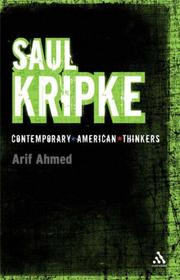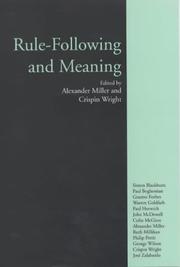| Listing 1 - 10 of 26 | << page >> |
Sort by
|

ISBN: 0826492614 0826492622 9780826492616 9780826492623 Year: 2007 Publisher: London Continuum
Abstract | Keywords | Export | Availability | Bookmark
 Loading...
Loading...Choose an application
- Reference Manager
- EndNote
- RefWorks (Direct export to RefWorks)
Book
ISBN: 387718622X Year: 1988 Publisher: Rheinfelden Schäuble
Abstract | Keywords | Export | Availability | Bookmark
 Loading...
Loading...Choose an application
- Reference Manager
- EndNote
- RefWorks (Direct export to RefWorks)
Book
ISBN: 3520661012 Year: 1986 Publisher: Stuttgart Kröner
Abstract | Keywords | Export | Availability | Bookmark
 Loading...
Loading...Choose an application
- Reference Manager
- EndNote
- RefWorks (Direct export to RefWorks)
Book
ISBN: 1317489160 1317489179 131571051X 1844653056 1282534556 9786612534553 9781844653058 9781317489177 1902683889 9781902683881 9781315710518 9781282534551 6612534559 9781317489160 1902683870 9781902683874 1902683889 9781902683881 Year: 2004 Publisher: Chesham Acumen
Abstract | Keywords | Export | Availability | Bookmark
 Loading...
Loading...Choose an application
- Reference Manager
- EndNote
- RefWorks (Direct export to RefWorks)
Saul Kripke is one of the most original and creative philosophers writing today. His work has had a tremendous impact on the direction that philosophy has taken in the last thirty years and continues to dominate some of its most fundamental aspects. Given Kripke's importance it is perhaps surprising that there is no introduction to his philosophy available to the general student. This book fills that gap. As much of Kripke's work is highly technical, the book's central aim is to provide clear exposition of Kripke's ideas in a form that is understandable to a beginning readership as well as a commentary on them that more advanced students will find useful. The book begins with a discussion of Kripke's early work on modal logic, which provides the foundation for many of his later philosophical contributions, before examining in detail Kripke's central ideas and arguments contained in Naming and Necessity. In further chapters Kripke's work on semantic paradoxes and his theory of truth are outlined as well as his controversial interpretation of Wittgenstein's famous private language argument. Kripke's ideas are situated alongside those of his precursors and some of the most important and interesting responses to them are explored. The reader is thus able to appreciate the path-breaking nature of Kripke's contributions, how they have challenged fundamentally traditional interpretations, and how they have sparked some of the most important philosophical debates of recent years.
Book
ISBN: 9780745652849 9780745652856 0745652859 Year: 2013 Publisher: Cambridge: Polity press,
Abstract | Keywords | Export | Availability | Bookmark
 Loading...
Loading...Choose an application
- Reference Manager
- EndNote
- RefWorks (Direct export to RefWorks)
Kripke, Saul --- Kripke, Saul A., --- Kripke, Saul A., - 1940 --- -Kripke, Saul A., --- -Kripke, Saul A., - 1940 --- -Kripke, Saul --- -Kripke, Saul A., - 1940-
Multi
ISBN: 9780521858267 9780521674980 0521674980 9780511780622 9781139160858 1139160850 0511780621 0521858267 1107218489 1139152440 1283340925 9786613340924 1139159852 1139155296 1139158805 1139157043 Year: 2011 Publisher: New York, NY Cambridge University Press
Abstract | Keywords | Export | Availability | Bookmark
 Loading...
Loading...Choose an application
- Reference Manager
- EndNote
- RefWorks (Direct export to RefWorks)
"This collection of essays on Saul Kripke and his philosophy is the first and only collection of essays to examine both published and unpublished writings by Kripke. Its essays, written by distinguished philosophers in the field, present a broader picture of Kripke's life and work than has previously been available to scholars of his thought. New topics covered in these essays include vacuous names and names in fiction, Kripke on logicism and de re attitude toward numbers, Kripke on the incoherency of adopting a logic, Kripke on color words and his criticism of the primary versus secondary quality distinction, and Kripke's critique of functionalism. These essays not only present Kripke's basic arguments but also engage with the arguments and controversies engendered by his work, providing the most comprehensive analysis of his philosophy and writings available. This collection will become a classic in contemporary analytic philosophy"--
Philosophers --- Philosophes --- Kripke, Saul A., --- Kripke, Saul --- Arts and Humanities --- Philosophy --- Kripke, Saul A., - 1940 --- -Kripke, Saul A., --- -Kripke, Saul --- -Kripke, Saul A., - 1940

ISBN: 1317489640 1317489659 1315710676 1282921363 9786612921360 1844653358 9781844653355 9781317489658 9781902683508 1902683498 1902683501 9781317489641 9781315710679 9781282921368 6612921366 Year: 2002 Publisher: Stocksfield [U.K.] Acumen
Abstract | Keywords | Export | Availability | Bookmark
 Loading...
Loading...Choose an application
- Reference Manager
- EndNote
- RefWorks (Direct export to RefWorks)
The rule-following debate, in its concern with the metaphysics and epistemology of linguistic meaning and mental content, goes to the heart of the most fundamental questions of contemporary philosophy of mind and language. This volume gathers together the most important contributions to the topic, including papers by Simon Blackburn, Paul Boghossian, Graeme Forbes, Warren Goldfarb, Paul Horwich, John McDowell, Colin McGinn, Ruth Millikan, Philip Pettit, George Wilson, Crispin Wright, and José Zalabardo. The debate has centred on Saul Kripke's reading of the rule-following sections in Wittgenstein and his consequent posing of a "sceptical paradox" that threatens our everyday notions of linguistic meaning and mental content. These essays are attempts to respond to this challenge and represent some of the most important work in contemporary theory of meaning. With an introductory essay and a comprehensive guide to further reading the book is an excellent resource for courses in philosophy of mind, philosophy of language, Wittgenstein, and metaphysics, as well as for all philosophers, linguists, and cognitive scientists with interests in these areas.
Meaning (Philosophy) --- Language and languages --- Philosophy. --- Wittgenstein, Ludwig, --- Kripke, Saul A., --- Kripke, Saul A.
Book
ISBN: 1902683889 1902683870 9781902683881 9781902683874 Year: 2004 Publisher: Chesham: Acumen,
Abstract | Keywords | Export | Availability | Bookmark
 Loading...
Loading...Choose an application
- Reference Manager
- EndNote
- RefWorks (Direct export to RefWorks)
Theory of knowledge --- Kripke, Saul --- Kripke, Saul A., --- Philosophy, American --- Philosophie américaine --- Philosophie américaine --- Kripke, Saul A., - 1940 --- -Philosophy, American --- -Theory of knowledge --- -Kripke, Saul A., - 1940-
Book
ISBN: 9781032139975 9781032147321 Year: 2024 Publisher: New York London Routledge
Abstract | Keywords | Export | Availability | Bookmark
 Loading...
Loading...Choose an application
- Reference Manager
- EndNote
- RefWorks (Direct export to RefWorks)
Kripke, Saul A., --- Wittgenstein, Ludwig, --- Critique et interprétation
Multi
ISBN: 9783764385040 3764385049 Year: 2014 Publisher: Basel [Switzerland] : Birkhauser,
Abstract | Keywords | Export | Availability | Bookmark
 Loading...
Loading...Choose an application
- Reference Manager
- EndNote
- RefWorks (Direct export to RefWorks)
Possible worlds models were introduced by Saul Kripke in the early 1960s. Basically, a possible worlds model is nothing but a graph with labelled nodes and labelled edges. Such graphs provide semantics for various modal logics (alethic, temporal, epistemic and doxastic, dynamic, deontic, description logics) and also turned out useful for other nonclassical logics (intuitionistic, conditional, several paraconsistent and relevant logics). All these logics have been studied intensively in philosophical and mathematical logic and in computer science, and have been applied increasingly in domains such as program semantics, artificial intelligence, and more recently in the semantic web. Additionally, all these logics were also studied proof theoretically. The proof systems for modal logics come in various styles: Hilbert style, natural deduction, sequents, and resolution. However, it is fair to say that the most uniform and most successful such systems are tableaux systems. Given a logic and a formula, they allow one to check whether there is a model in that logic. This basically amounts to trying to build a model for the formula by building a tree. This book follows a more general approach by trying to build a graph, the advantage being that a graph is closer to a Kripke model than a tree. It provides a step-by-step introduction to possible worlds semantics (and by that to modal and other nonclassical logics) via the tableaux method. It is accompanied by a piece of software called LoTREC (www.irit.fr/Lotrec). LoTREC allows to check whether a given formula is true at a given world of a given model and to check whether a given formula is satisfiable in a given logic. The latter can be done immediately if the tableau system for that logic has already been implemented in LoTREC. If this is not yet the case LoTREC offers the possibility to implement a tableau system in a relatively easy way via a simple, graph-based, interactive language. >dy>.
Mathematical logic --- Mathematics --- wiskunde --- logica --- Modality (Logic) --- Kripke, Saul A.,
| Listing 1 - 10 of 26 | << page >> |
Sort by
|

 Search
Search Feedback
Feedback About UniCat
About UniCat  Help
Help News
News